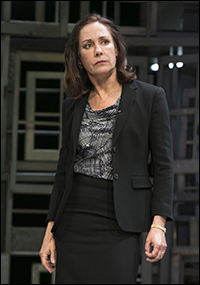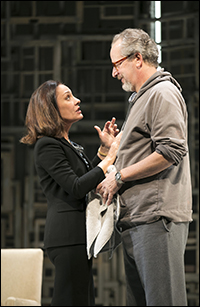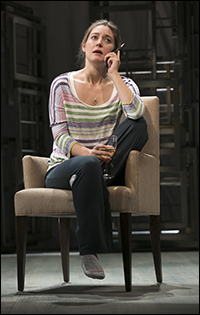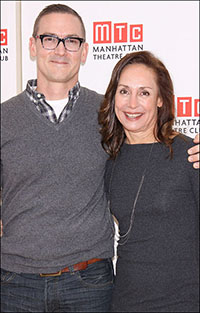
*
Sharr White is the author of The Other Place, which opened on Broadway earlier this month at Manhattan Theatre Club's Samuel J. Friedman Theatre to critical praise for the play and its star, Laurie Metcalf.
White's drama was first presented Off-Broadway in 2011 by MCC Theater, where it was nominated for two Outer Critics Circle Awards, a Drama League Award and three Lucille Lortel Awards. Metcalf won an Obie Award and a Lucille Lortel Award for her portrayal of Juliana Smithton, a successful neurologist with an increasingly troubled life. Joe Mantello, a two-time Tony winner (Take Me Out and Assassins) directed the drama for both MCC and now MTC. The Broadway cast includes Daniel Stern, Zoe Perry (Metcalf's real-life daughter) and John Schiappa.
White, 42, has been writing plays since the 1990s. They've been presented around the country, including at South Coast Repertory, Actors Theatre of Louisville, Oregon Shakespeare Festival, Lincoln Center Theatre's Directors Lab and Key West Theatre Festival. But when The Other Place played MCC, it marked his first major New York appearance, and now it is his first Broadway show.
We contacted White to talk about The Other Place, the kinds of plays he prefers to write, his day job and his long and winding road to Broadway. How do characterize The Other Place, for those readers who haven't seen it?
Sharr White: I often say that it's about the smartest woman on Earth, who discovers that nothing is what she thinks it is. It is a bit of a mystery in the way the play unfolds. It's a story that's told very closely through her perspective. It's really about Juliana being a reliable narrator, and we stay with her as she begins to understand that her world is not what she thinks it is.
What's the genesis of the play? Where did the idea come from and how did it come into being? And how did you get Laurie Metcalf — a three-time Emmy winner for "Roseanne" — to star in it?
SW: I had a friend who challenged me to write a play on this subject matter. I was resistant at first. I didn't think it could work. But he was very insistent. And the more I started looking into the structure of building a play in the way this play is built the more excited I became. And the more personal the story became too.
Laurie's involvement was really fortunate. When I was developing the play at MCC Theater they had several readings, and the third reading they had was with Laurie, and I assume it was just because they loved her and she was in town at the time. And it was after that reading that MCC committed to it, and soon thereafter Laurie committed to the play as well.
How do you feel about Laurie Metcalf in the role, her incarnation of your character?
SW: She's taken it beyond where I thought it would go. What's been so great about working with Laurie is that because she was involved so early, I began shaping the role toward her. The role has co-evolved along with her. It's been a supreme pleasure to be able to work with her like that. Because she's the best.
 |
||
| Laurie Metcalf in The Other Place. |
||
| Photo by Joan Marcus |
SW: I've been lucky enough to see it two other times. The fortunate thing is that it works. It works beautifully. Everybody's going to bring their own personality to it. There was a wonderful production in San Francisco [at Magic Theatre] just before this production. Henny Russell starred. She's understudying in New York. She was wonderful in San Francisco. So I'm not concerned about it. How did the play get to Broadway?
SW: Manhattan Theatre Club had seen the script in an earlier form and had always loved the play. And after the MCC run ended they felt that they wanted to bring the play to a larger audience. So I feel very fortunate about that too. Because the MCC run was difficult to end. We felt we had built a wonderful experience. We're all very happy that it has been able to have this much larger second life.
How do you feel about having a play on Broadway?
SW: It feels on one hand incredible and on the other hand unbelievable. I think every playwright ultimately wants a play on Broadway or wonders how it would be to have a play on Broadway. But few get the chance. So I just feel really fortunate to be involved with the people I've been involved with who've been such advocates of the play.
Were there many changes between MCC and Broadway?
SW: I did some changes. I would say there were few changes but crucial ones. There's a lot of medical language in the play, and after conversations with Joe [Mantello] and with Manhattan Theatre Club I did some trims on that medical language just to pull the medical aspect of the play back and pull Juliana's, the protagonist's, story forward. It's a very lean script. I think what occurred because of [the changes] was a very large result.
 |
||
| Laurie Metcalf and Daniel Stern |
||
| Photo by Joan Marcus |
SW: No, there was no concern at all. In earlier incarnations of the play it was about an hour and a half, including an intermission. It's a fairly intense play. As we kept workshopping the play and bringing the story out more directly it just naturally became shorter and shorter. I think if the play were much longer it might wind up being too much. Because again, it does pack a punch The play concerns a disintegrating mind. The word Alzheimer's is never used in the play. Is there a reason? Was it in an earlier draft?
SW: It was. It was in all the earlier drafts until we started finally heading into the rehearsal process at MCC. Joe thought, "Let's go through it just to see what happens if we take the word Alzheimer's out." It was in there three times, I think, in the final rehearsal script. Again, that was really about not making it an Alzheimer's play but making it a play about this woman within the circumstance that she's in. We very much didn't want to make it about what she's got.
You've written several other plays, one of which, Six Years, was performed in 2006 at the Humana Festival of New American Plays at the Actors Theatre of Louisville. Are they very different from The Other Place? Are you interested in a range of subjects and styles?
SW: They're very different. I've tried to change my structure, my focus, with every play. When I'm done with something there's definitely an afterglow that goes on for a long time, and I get very afraid of repeating myself. I'm also looking for the challenge of a new structure and a new format. Six Years was fairly epic in nature [its five scenes cover 24 years of one couple's life after World War II]. In the following play, Sunlight [about a liberal president of a university and a conservative dean of a law school], I was trying to work on a very-well-made-play structure, and then for this one I wanted to just blow the structure out. I felt the story itself demanded that it be approached in a more fractured way that still felt reliably like a three-act structure. I think that on a visceral level it's a three-act structure. I feel I want to work in a different format with each play.
The Other Place is a very specific, small-cast (four actors) character study. Do you think of the economics of theatre when you write?
SW: I think on a certain level you have to. But at the same time I think this was a play that called for fewer actors rather than more. The new play I'm working on now [The Snow Geese, about a family in Syracuse, NY, during World War I] started with 12 characters. I've whittled it down to six. But there is certainly an economic factor in theatre producing that you have to take into account. It's possible to find a first home for a large cast but it's really hard to find more homes for a large cast after a first production happens. There are very few places in the country where you can actually do it. I'm glad for the life of The Other Place that it's a small-cast play, but I think that this story is one that needed to be done with actors playing multiple roles, because of the condition of Juliana.
Do you have a sprawling, large-cast play somewhere in your files? Or in your future?
SW: I think part of a playwright's career can also be proving one's worth or produceability enough with earlier plays that you're slowly given more trust in building more and more complex pieces. I think that's ultimately what I'm working up to. I think I also look at myself as someone in the middle or beginning of really honing my skills. I want to learn how to write larger plays too.
 |
||
| Zoe Perry in The Other Place. |
||
| Photo by Joan Marcus |
SW: I am working in fashion advertising as a copywriter. It's a career I've developed over the course of the last 13 years. It's providing a steady life for my family, which I need. And also a real stability for me to be able to write. I've got a lot of friends who are making a living as writers, and it can be tough. It's a tough life. It's essentially a freelance life. And right now I treasure the stability my job brings. Is your day job the kind that helps or hinders your playwriting?
SW: I think it's helped my playwriting on a number of levels. When I first entered the corporate world, because that's really what this was, I had been waiting tables for eight years. Something had started happening to me in the middle of that life, which is that I couldn't find a way out. I think that that negatively impacted my writing, for one thing. And for another thing, I think I am working with language all day long, just on a different level. It's taught me on a very technical level how to work with language, how to sharpen a sentence or how to soften it. It sounds nerdy, but what a front fricative will do versus a dental. Language has sounds that bring emotional impact, and I think what I've learned from copywriting is how to wield that more effectively.
Tell me about your family.
SW: My wife, Evelyn, and I have two sons, ages 6 and 7, and we live up in Cold Spring, NY, in the Hudson Valley. It's beautiful there.
Do you have a writing schedule on a typical workday?
SW: I get up really early and write, and I get on the train and write on the train coming down to work, and then I work, and then I write on the train back up, and I'm usually home just in time to put the boys to bed. It's a pretty tightly scheduled life. But we're making it work. Or my wife is really making it work.
Do you write on weekends?
SW: I usually write on weekends. It depends on what state I'm in with a new play. If I'm actively writing something and I'm under deadline then I'll get up on Saturdays and Sundays too, really early before the boys do, and get an hour and a half in and usually take a nap in the afternoon. I generally try to write every single day.
 |
||
| White and Laure Metcalf |
||
| Photo by Joseph Marzullo/WENN |
SW: I was born in Frederick, MD, and moved to Southern California when I was small, to Orange County. I went to junior high and high school in Boulder, CO. And after high school I went back to Southern California. I wasn't sure what I wanted to do. I took some time off. I worked in a warehouse for a while. Then I went back to school. I took some biology classes at a junior college in Southern California. I was sort of planning to be a biologist because my father is in science; he's a biophysicist and physiologist. Then I took some acting classes and I got hit with the theatre bug and I moved to San Francisco with the naïve idea that I'll get into A.C.T. [American Conservatory Theatre] because I hear that's a great school. But I was lucky in that I did get into A.C.T., so I went to San Francisco State for a little bit and then I jumped over to A.C.T. and finished the acting program there. I started writing at A.C.T., though they didn't have any writing classes. But we were doing created projects and I started writing for my classmates. By the time I graduated [with an M.F.A.] in 1993 I thought writing was the thing for me. So I moved to New York. I was doing some auditioning, but mostly I was writing. I knew, several years in, that I should just commit to writing because [when I did so] I stopped not wanting to go on auditions because it would ruin a good writing day. From there it was a long process for me, because I didn't go to grad school for writing, I didn't go to any writing programs, I wasn't formally trained at all. I felt like when I reached a point in beginning to develop I didn't have anyone to turn to, which was pretty isolating. My time in New York has been about writing, writing, writing. I did some self-producing in the '90s. The big break was with Humana Festival in 2006. I was able to start surfacing to people, and I got a couple of commissions. It's been a long process to get here.
What's next for you?
SW: The Snow Geese. I'm developing it right now. And we'll see what happens. You never really know.
One final question. Your first name, Sharr, is unusual. Do you know its origin, how it came into your parents' minds?
SW: I keep asking my parents about this. It's not always clear. They wanted original names for their kids. And so that's what I got. I'm happy with it now, but I was not happy with it when I was in third grade.









